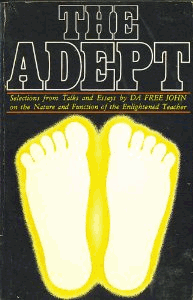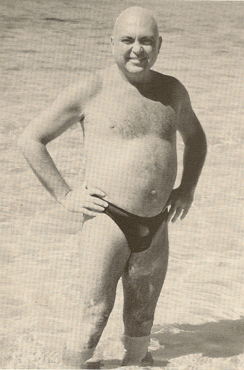
Selections from Talks and Essays by
Da Free John on the Nature and Function of the Enlightened
Teacher

Da Free John – 1983
I N T R O D U C T I O
N
“Adept” is a word that is not
prominent in the daily vocabulary of most people. If it is
used at all, it is generally employed as an adjective, in
the sense of “experienced” or “skilled.” As a noun, the word
is largely confined to more scholarly contexts, where it
denotes an initiate of an esoteric tradition or teaching.
Neither of these two principal connotations quite applies to
the way in which the term is used on the following pages,
even though there is a definite overlap.
The Adept, as understood here, is
one who has transcended all of the limitations normally
considered to be inevitable in human life. Notably, he has
gone beyond the mistaken identification with the body-mind
as it is ordinarily experienced. He knows it to be markedly
different from the way it is commonly understood, and
therefore he also relates to it differently. He is
irrevocably certain that the body is more than the visible
male or female organism and that, together with the mind, it
is a multidimensional reality within an equally
multidimensional and paradoxical universe. This he knows to
be the case from firsthand “experience,” or rather from a
Realization that transcends experience, and not merely as a
matter of opinion or belief.
He shares this “experience” with the
conventional mystic, yogi, or sage. Where he goes beyond
their spiritual realization and comprehension of reality is
in his utter and permanent transcendence of the ego. In
other words, the Adept has altogether ceased to identify
with the body-mind or any of the phenomena associated with
it. He is Conscious as the identity of the Total Field of
Being. He is all there is. He is an initiate not of any
esoteric school, but of the Mystery of existence
itself.
His Condition must not be confused
with any altered state of awareness or mystical attainment,
which are only temporary changes in the quality of the
body-mind (in its wider sense). He does not, strictly,
experience anything, because all phenomena, including the
body-mind with which he was previously associated through an
act of (mistaken) identification, simply arise in the
Expanse of the Being that he is.
This is a brainteaser and difficult
even to picture, which is part of the problem of
communicating the Adept’s Realization. It does not make much
logical sense. As with some of the findings of quantum
physics, one can perhaps have an intuitive sense of this
Condition, but even then the mind is baffled by its
paradoxical nature. For, how can one be conscious of
anything if there is no ego or subjective center of
experience? This question only poses itself by virtue of the
widespread misconception of the nature of consciousness.
According to the current (materialist) interpretation of
human existence, consciousness is a brain phenomenon, a
firing of the cerebral synapses. In this view, it gets
snuffed out the moment the brain cells die. But apart from
being an obviously unwarranted reduction of mental processes
to biochemical activity, this theory deals not with
consciousness but only with the contents of consciousness.
This is, in fact, all that science can ever hope to analyze
or attempt to understand. For, consciousness is the
Transcendental Witness, or Being-Consciousness, that does
not undergo any modification and that is the Universal
Matrix of all changing conditions pertaining to the manifest
realm of existence.
This is the unequivocal message of
the long history of mysticism and the authoritative
testimony of the great Adepts of humanity. Eliot Deutsch,
professor of philosophy and longstanding researcher into
Eastern traditions, suggests that there are two primary
modes of consciousness-the “bound” or personal consciousness
and the “boundless” or universal consciousness which is here
styled the Transcendental Consciousness.
Consciousness is bound whenever
it is in virtue of its objects. (‘My’) consciousness is
bound whenever I discern objects perspectivally through
dynamic modes of selectivity (and enable them to be for me).
(‘My’) consciousness is bound when reflexively I am aware of
being aware of a certain content. (‘My’) consciousness is
bound whenever it is in virtue of an intersubjective
community of awareness and is dependent upon an other.
(‘My’) consciousness is bound when, as an organic
temporality, it is informed by an irrevocable history.
(‘My’) consciousness is utterly bound when its desire-laden
contents are completely involuntary….
Consciousness is boundless when,
as a power of being, as an essential feature of the self, it
is without determinate content. Consciousness is boundless
when, unselfconsciously, ‘I’ am at one with
reality.1
This analysis of consciousness into
two modalities reflects the inherent difficulty of
expressing the paradoxical nature of consciousness. Further
clarity can be achieved when one recognizes that there is
only BeingConsciousness and that the so-called
empirical “I”-consciousness is an illusion superimposed on
that Transcendental Consciousness. Consciousness, in other
words, is always boundless, but because of the play of
attention in the manifest domain of existence, there arises
the illusion of being bound. Thus, strictly speaking, there
is only one primary mode of consciousness, namely
Being-Consciousness. What appears as the finite
consciousness, in which subject and object are separated, is
a phantom that in no way modifies or negates the
Transcendental Consciousness.
This is the testimony of the Adepts,
who have Realized this uniform Being-Consciousness that is
undifferentiated and free of the mechanicalness of Nature.
And this perspective is truly liberating, since it grants
human beings the innate capacity for total
self-transcendence: One does not need to be implicated in
the drama of the personal or egoic consciousness. Indeed,
there is a movement in reality itself by virtue of which
some individualspossibly in increasing numbers as
humanity evolves spiritually-feel “metamotivated” to
Realize the Consciousness prior to the play of selective
attention in the finite realms of body and mind. Such
individuals are drawn to spiritual (or genuinely
self-transcending) life and the discipline and commitment
this requires. So long as the material world, and its
cause-andeffect laws, are thought to express the
fullness of existence, there is no hope for mankind to grow
beyond its present level of acute self-obsession. However,
once it is understood that the universe is not what it seems
to be, but a psycho-physical process of immense magnitude
and complexity, spontaneously occurring against the backdrop
of the Unity of the BeingConsciousness, it is possible
to look upon one’s individual life, and mankind’s generic
potential, in a radically different way.
Then life is seen as a school in
which spiritual lessons are to be learned. And the Adepts
are recognized to be the “specialists” or “experts” who can
facilitate this process of learning and readaptation by
their Teachings, and more so by their sheer
Presence.2
But to come to this point of insight
and recognition, a person must be willing to drop a good
many prejudices and preconceived notions about the world and
himself. More likely than not, the majority of people will
not be able to inspect and suspend their private cosmology
long enough to allow the Adepts’ argument to make its point.
They would have to struggle against the tide of deeply
entrenched beliefs, neurotic expectations, and consoling
hopes, as well as the terror of true
self-knowledge.
1. Eliot Deutsch,
Personhood, Creativity and Freedom (Honolulu: University of
Hawaii Press, 1982), pp. 35-36
2. Capitalization of terms
like “Adept,” “Teaching,” and “Presence” is a simple device
to indicate that these words have a transcendental import.
For instance, the Adept’s Teaching is Empowered
communication, not mere verbal instruction or philosophy. It
carries a numinous
“charge” that aids others
in their ordeal of self-transformation. Because, as will be
explained, the Adept is coessential with the ultimate
Being-Consciousness, his entire life-every word or
gesture-is a direct and spontaneous expression of that
Reality. Hence the Adept’s behavior is always a
confrontation that has the unpremeditated purpose of
Awakening others.
Yet, those who are seriously
considering or attempting to engage spiritual life must
sooner or later confront the extraordinary mechanism that
the Enlightened Adept represents. The possibility of
maturing and fulfilling one’s spiritual practice without a
Realized Teacher is exceedingly slight. Many spiritual
aspirants in the West, who have been brought up to value
independence of mind, subscribe to the view that the best
guru is one’s own light or conscience, or the Divine Reality
directly. They are loath to consider the idea of
mediatorship, as they see it, in spiritual matters. And
their, bias is fueled by the numerous “gurus” who peddle
their wares in the spiritual marketplace, but who have
little or nothing of real spiritual worth to offer. They
are, therefore, rightly concerned about losing their
independent judgment in submission to such wolves in sheep’s
clothing.
At the same time, however, they must
realize that the principle of spiritual life is in fact
surrender of everything that one seems to be. The need for
rebellious independence from any authority is as immature as
the need for childish dependence on a teacher. For surrender
to be authentic, it must be a mature gesture. That is to
say, a practitioner must have clearly understood what is
required in his own case to penetrate the armor of the ego
and to orient his whole being to the Transcendental Reality,
and then simply do whatever is necessary and
appropriate.
Surrender to an Enlightened Teacher
is not surrender to another ego that may superimpose its
will on oneself. In the Adept’s case, there is no ego to
refract the Light of the Transcendental Being. Therefore,
there can also be no personality clash between the Adept and
the disciple or devotee. Whatever conflict may arise, it is
always in the reluctant devotee. For, the Adept simply
reflects back the devotee’s own negativity, hesitancy,
doubt, and all the other numerous forms of egoic
contraction. Simultaneously, the Adept magnifies in the
devotee the impulse to Enlightenment and strengthens in him
the intuition of the Ultimate
Being-Consciousness.
Surrender to the Adept is yielding
to the spiritual process itself. It, does not, as is
popularly feared, turn the devotee into a mindless zombie.”
The Adept is not motivated to exploit those who come to him
for Liberation. Rather, his entire Compassionate Activity is
geared to help devotees break loose from their present
enslavement to the mindless automaticities of
unEnlightened life.
This booklet offers a rich
compilation of excerpts from the talks and essays of a
living Adept, Master Da Free John, in which this great
GodRealizer addresses the reader directly about the
nature, function,’, and Teaching style of the Adepts, and
not least about his own Mission and Work.
The Editors

Selections from Talks and Essays by
Da Free John on the Nature and Function of the Enlightened
Teacher
Introduction
Part One
Part Two
Part Three
Part Four
Part Five
Part Six
Part Seven
Epilogue
|


